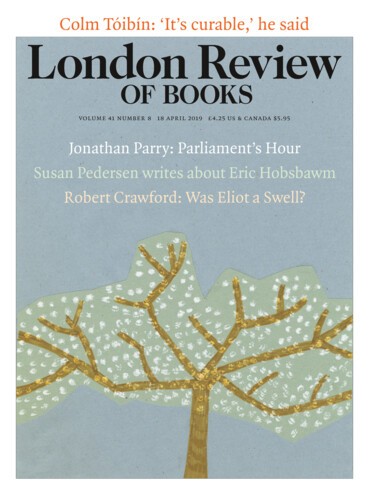For the past few months, Margarete Kraus’s face has been looking out at passengers in the lifts at Russell Square tube station. Photographed in the 1960s, she is leaning from the window of her caravan, smiling. Her Auschwitz prisoner number is tattooed on her left forearm. Kraus, who came from Czechoslovakia, was one of the hundreds of thousands of Roma and Sinti people targeted by the Nazis for extermination in the 1940s. Her story is told, alongside those of others, by an exhibition at the Wiener Holocaust Library.
Daniel Trilling
Daniel Trilling is the author of books on refugees in Europe and the far right in Britain.
At the House of European History in Brussels, a long display cabinet sets out the forces that have shaped Europe through the centuries: philosophy, democracy, rule of law, ‘omnipresence of Christianity’, state terror, the slave trade, colonialism, humanism, the Enlightenment, revolutions, capitalism, Marxism, the nation state. For each, a historical image is matched with something contemporary: for philosophy, you get a bust of Socrates and a photograph of Žižek; for revolutions, Liberty Leading the People and the uprising in Kiev’s Maidan Square; for the slave trade, iron shackles and a Banksy painting about child labour.
‘I’m not racist, but …’
Daniel Trilling, 18 April 2019
The word ‘Caucasian’ was first used as a term for white people in the late 18th century, by men who believed they were making objective scientific judgments about the world. In 1795, the naturalist Johann Friedrich Blumenbach, a professor at Göttingen University who owned a prodigious collection of human skulls, proposed the existence of five ‘varieties’ of...
Far-right terrorist ‘manifestos’, like the one apparently published by one of the Christchurch shooters, are a kind of Rorschach test, inviting the reader to finish the job by finding meaning in the incoherent and contradictory ideas it contains. An act of mass murder is turned into a global spectacle by the use of real-time social media networks. Traditional media organisations and individuals online are drawn into repeating, arguing over and sharing the claims and images made by the perpetrator.
The European Commission says the ‘migration crisis’ is over. It has published a fact sheet aimed at countering both the far right, who tell lies about migrants and refugees, and humanitarian campaigners who point to Europe’s complicity in the imprisonment and torture of people in Libyan detention camps. It acknowledges that some ‘structural problems remain’.
But what is over, and who is it over for?
Podcasts & Videos
Julia Ebner discusses her experiences going undercover in various extremist groups, including White Supremacists, German Neo-Nazis and ‘Trad Wives’, as described in her new book, Going Dark.
Read anywhere with the London Review of Books app, available now from the App Store for Apple devices, Google Play for Android devices and Amazon for your Kindle Fire.
Sign up to our newsletter
For highlights from the latest issue, our archive and the blog, as well as news, events and exclusive promotions.


